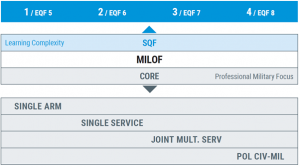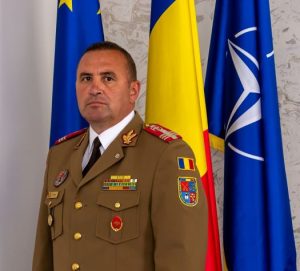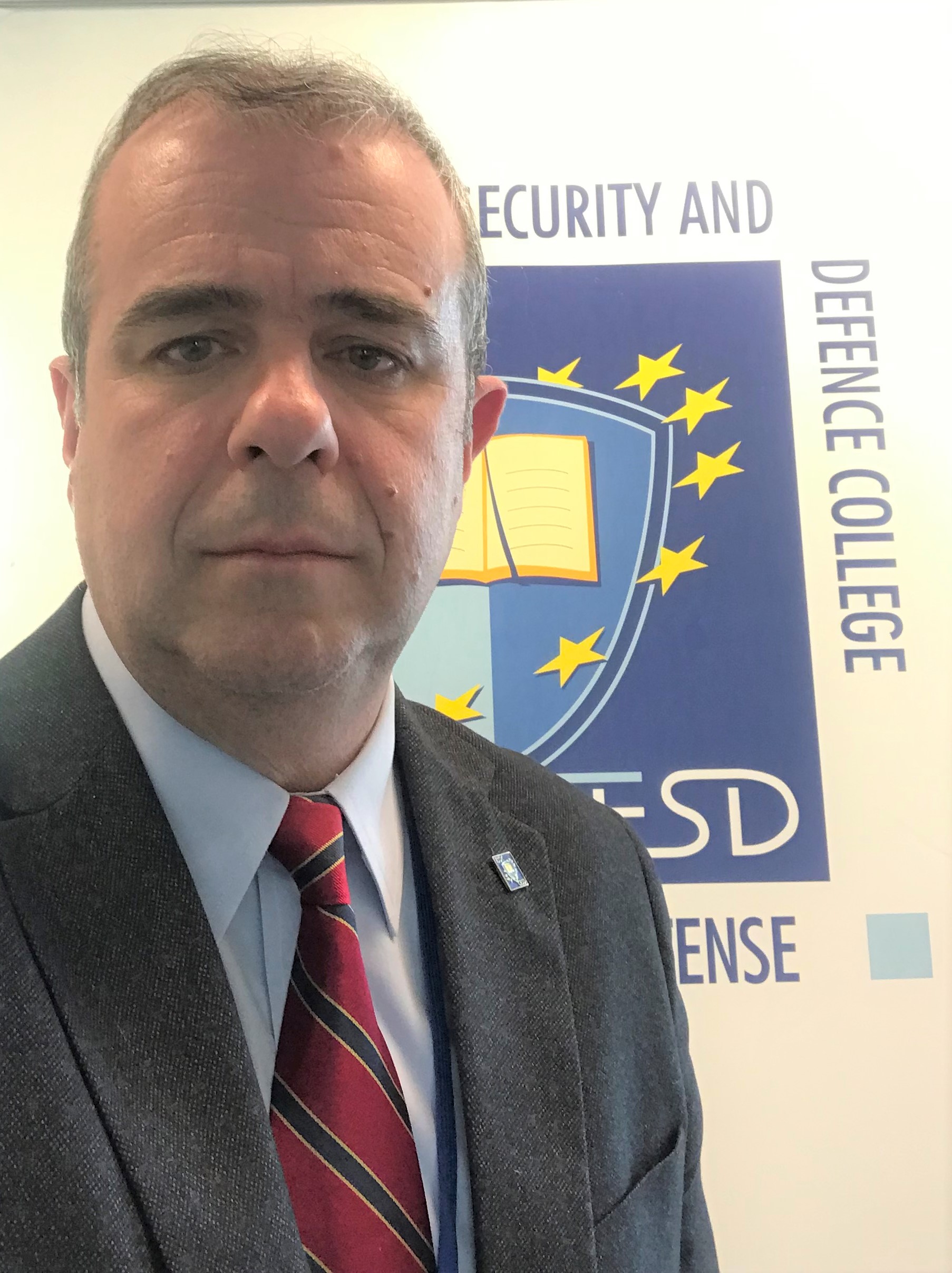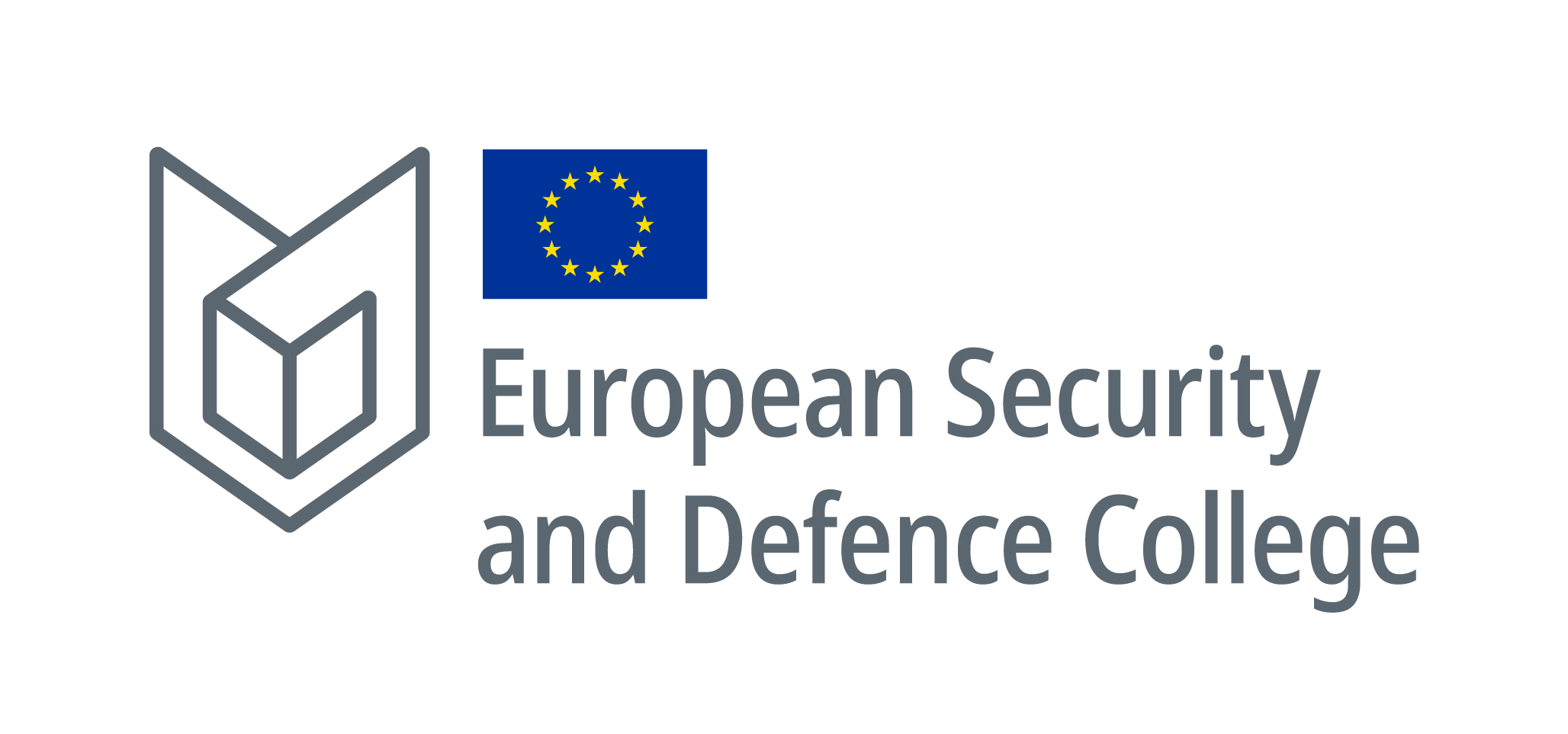SQF-MILEG
Sectoral Qualification Framework for the Military Officer Profession (SQF-MILOF)
How should an officer operate and act within the complex and multidimensional operating environment of the future, in which the EU will need to deploy its full range of capabilities in the area of security and defence? What competences do commanders expect from their officers in the event of unexpected and rapidly evolving internal and external security situations with military implications? What knowledge, skills, autonomy and responsibility should an officer acquire and master to meet the expected competence profile? The Sectoral Qualification Framework for all stages of the career of a military officer (SQF-MILOF) not only offers answers to these questions, but also makes available to the Member States (MS) practical roadmaps for its implementation.Why the SQF-MILOF?
Education and training are the responsibility of the MS. However, a high level of interoperability can only be achieved through a transparent and critical approach to the development of military training, education programmes and systems. SQF-MILOF is a tool designed to promote cooperation. It does so by offering MS a platform that promotes the exchange of views on the requisite level of performance and learning needed by military officers. In July 2016, the Chairman of the EU Military Committee requested that the European Security and Defence College develop a SQF-MILOF. Based on work concluded under the European Initiative for the Exchange of Young Officers in 2014, the SQF-MILOF describes, at all the different stages of a military career, what MS can expect an officer to know, be able to do and at what level of autonomy and responsibility. After extensive consultation with MS, a working group under the ESDC, with direct support from the EU Military Staff, concluded the SQF-MILOF at the end of 2020. Once complete, the SQF-MILOF passed through a rigorous evaluation and validation processes. Externally, a team of three independent international experts provided valuable recommendations and assessed it to be a product of quality, relevance and immediate value to the sector. Internally, national competent authorities were formally consulted, and they validated the SQF-MILOF. In addition, selected national education and training providers and volunteer officers from the EU Military Staff informally tested its implementation roadmaps.What is the SQF-MILOF? The SQF-MILOF Package
SQF-MILOF relates to lifelong learning for a particular sector: military officers. It is fully in line with the European Qualification Framework that is applicable in the general education system throughout the EU and partner countries in the Bologna process. The SQF-MILOF serves as an interface or ‘translation tool’ between the education and training opportunities offered in different countries, which makes it possible to compare different programmes. This makes it easier to recognise equivalent training done in another country, which in turn facilitates professional education and training exchanges between the MS and thus enhances the creation of a common security and defence culture. Although learning is its core business, the SQF-MILOF is more than merely a taxonomy of learning levels. It is a package of products including adjacent areas of the learning process, such as professional development or quality assurance. The first element of the SQF-MILOF package is the Competence Profile, which describes the competences that military officers should possess in order to carry out their duties. The Competence Profile informs the identification of learning that has to be achieved in various study or operational contexts (Learning Profile). The Learning Profile (core business) is composed of two linked elements: the SQF-MILOF proper and the MILOF Core Curriculum (MILOF-CORE). The SQF-MILOF encourages national training and education providers issuing military qualifications to consistently observe the principles of European quality assurance. Finally, as part of the package, a Military Qualifications Database will help ensure the transparent exchange of information. The core business of the SQF-MILOF package is to frame professional learning for military officers into four levels of complexity (SQF-MILOF proper) and focus its scope on four levels of operations or military organisational architecture (MILOF-CORE). In practical terms, the four levels of complexity of learning range from comprehensive (level 1) to the most advanced knowledge and professional skills (Level 4), whereas the four levels of professional military focus define relevant learning from the individual and low tactical level (Single Arm/Branch) up to the strategic level (Political Civil-Military).
The core business of the SQF-MILOF package is to frame professional learning for military officers into four levels of complexity (SQF-MILOF proper) and focus its scope on four levels of operations or military organisational architecture (MILOF-CORE). In practical terms, the four levels of complexity of learning range from comprehensive (level 1) to the most advanced knowledge and professional skills (Level 4), whereas the four levels of professional military focus define relevant learning from the individual and low tactical level (Single Arm/Branch) up to the strategic level (Political Civil-Military).
What are the benefits of the SQF-MILOF Package and how can MS use its components?
The SQF-MILOF Package facilitates and provides MS’ relevant authorities and institutions with the right tools to:- inform the harmonisation of military officer competences reflected in the national occupational standards (through the Competence Profile);
- facilitate the levelling of national military qualifications against the SQF-MILOF consistent with National Qualifications Frameworks and European Qualifications Framework levels (through the high-level learning outcomes of the SQF-MILOF);
- support the harmonisation of learning outcomes of similar programmes across MS, facilitate the efforts of military education and training providers to develop learning-outcome-based curricula and help individual learners to identify their professional learning proficiency (through the detailed learning outcomes of the MILOF-CORE);
- compare similar qualifications across MS, thus facilitating the exchange of military students and course participants at any stage of their military careers (through the Military Qualifications Database); and
- ensure that national military qualifications follow European quality standards (through the SQF-MILOF Quality Assurance Principles).
SQF-MILEG (SQF-MILOF Executive Group)
The implementation of the SQF-MILOF will be carried out under the supervision of the competent national authorities via the designated representatives, working as the SQF-MILOF executive group (SQF-MILEG). The SQF-MILEG has been established in December 2021 and its’ role is to facilitate and support interested Member States in the voluntary implementation of the SQF-MILOF at national level. The SQF-MILEG will be meeting on a quarterly basis and has the following objectives:- Taking note of the national periodic reports on SQF-MILOF implementation
- Establishing specific guidelines for particular aspects of the implementation of the SQF-MILOF at EU, national and individual level
- Monitoring the publication by the MS of National Military Qualifications (NMQ) in the Military Qualifications Database (MQD)
- Organising peer-learning activities to support relevant bodies in the MS in the SQF-MILOF implementation
- Facilitating MS’ efforts to develop service-oriented or specialised SQFs, should the MS express an interest in this type of instrument
The SQF-MILOF Package
The Sectoral Qualifications Framework for the Military Officer Profession -SQF-MILOF package is published in two volumes and a brochure. (You can download the publications at the links below) Volume 1 describes the SQF-MILOF rationale and context and the development, validation and roadmaps for implementation. It has both historical and documentary value. Volume 2 is more technical, where interested practitioners can find useful information such as the Competence Profile or the taxonomy of learning outcomes in the tabular format of the SQF-MILOF and MILOF-CORE. Brochure explains what the SQF-MILOF in a nutshell is.SQF-MILEG:
Chairperson:
 COL Lucian ISPAS, PhD, is a Romanian officer with comprehensive experience in Education, Training, Leadership, and Staff Planning.
He is currently serving as Vice-rector for Academics at” Nicolae Bălcescu” Land Forces Academy of Sibiu, since 2021. He is responsible for managing the military education and training specific to cadets and young officers in the context of the new challenges of the international environment, by planning and organizing education and training activities, coordinating education quality control, planning and organizing the students’ evaluation activities, admission exams, and license exams. He is also involved in the development of curricula, syllabi, and other educational planning and organizing documents.
He held the positions of Dean of the Faculty of Military Sciences (2012 – 2020) and Head of the Military Sciences Department (2015 – 2020). He was also an Associate Professor and an Assistant Professor (2008 – 2015) at “Nicolae Bălcescu” Land Forces Academy of Sibiu.
Beginning his military career in 1995, he initially served in various command and staff positions at the 166th Reconnaissance Battalion, before transitioning into teaching roles at the Land Forces Academy, where he held lectures and organized practical activities in the fields of Tactics, Anti-Terrorist Training, Force Protection, Reconnaissance and Survival.
COL Ispas was appointed as military advisor of the ANA Training Detachment (2004 – 2005). He was deployed in Afghanistan during the Enduring Freedom Mission, being responsible for planning the training and mission readiness of company commanders of the Afghan Army, drafting training management and organization plans, readiness and training for real missions and accompanying Afghan subunits in combat missions.
COL Ispas holds a PhD in Military Science and Intelligence, and a Master of Science degree in Inter Arms Command from “Carol I” National Defence University, and also a Master of Science degree in Diplomacy and Foreign Policy in International Relations and a Bachelor’s degree in Social Management, from “Lucian Blaga” University of Sibiu.
He has extensive teaching experience and has published widely in the fields of Military Training, Military Operational Arts, Tactics, Cultural Awareness and Military Capabilities.
Of late, COL Ispas has been directly involved in successfully levelling the military qualifications delivered by “Nicolae Bălcescu” Land Forces Academy of Sibiu for the SQF-MILOF standards, ensuring compliance at both undergraduate and postgraduate levels.
COL Lucian ISPAS, PhD, is a Romanian officer with comprehensive experience in Education, Training, Leadership, and Staff Planning.
He is currently serving as Vice-rector for Academics at” Nicolae Bălcescu” Land Forces Academy of Sibiu, since 2021. He is responsible for managing the military education and training specific to cadets and young officers in the context of the new challenges of the international environment, by planning and organizing education and training activities, coordinating education quality control, planning and organizing the students’ evaluation activities, admission exams, and license exams. He is also involved in the development of curricula, syllabi, and other educational planning and organizing documents.
He held the positions of Dean of the Faculty of Military Sciences (2012 – 2020) and Head of the Military Sciences Department (2015 – 2020). He was also an Associate Professor and an Assistant Professor (2008 – 2015) at “Nicolae Bălcescu” Land Forces Academy of Sibiu.
Beginning his military career in 1995, he initially served in various command and staff positions at the 166th Reconnaissance Battalion, before transitioning into teaching roles at the Land Forces Academy, where he held lectures and organized practical activities in the fields of Tactics, Anti-Terrorist Training, Force Protection, Reconnaissance and Survival.
COL Ispas was appointed as military advisor of the ANA Training Detachment (2004 – 2005). He was deployed in Afghanistan during the Enduring Freedom Mission, being responsible for planning the training and mission readiness of company commanders of the Afghan Army, drafting training management and organization plans, readiness and training for real missions and accompanying Afghan subunits in combat missions.
COL Ispas holds a PhD in Military Science and Intelligence, and a Master of Science degree in Inter Arms Command from “Carol I” National Defence University, and also a Master of Science degree in Diplomacy and Foreign Policy in International Relations and a Bachelor’s degree in Social Management, from “Lucian Blaga” University of Sibiu.
He has extensive teaching experience and has published widely in the fields of Military Training, Military Operational Arts, Tactics, Cultural Awareness and Military Capabilities.
Of late, COL Ispas has been directly involved in successfully levelling the military qualifications delivered by “Nicolae Bălcescu” Land Forces Academy of Sibiu for the SQF-MILOF standards, ensuring compliance at both undergraduate and postgraduate levels.
ESDC Coordinator:
 George Kapogiannis is a Greek military officer with many years of experience in Training, Education, Human Resources, Project Management, Leadership and Operational Planning, seconded to ESDC by the Greek Army since November 2021. He is handling an extensive ESDC courses portfolio in the fields of Common Foreign and Security Policy (CFSP) and Common Security and Defence Policy (CSDP), by implementing project plans, managing project stakeholders, project team, project risk, schedule and related budget. He is in lead of the contribution to EU-NATO cooperation in the fields of Education / Training and also for the implementation of the Sectoral Qualification Framework for the military profession, being also the moderator of the respective Executive Group (SQF-MILEG). He has been appointed as EU and NATO Advance Operational Planning and Concepts Section Head at the Hellenic National Defence General Staff (2019-2021). During his assignment to NATO / SHAPE (2014-2017), he assumed the role of the Executive / Coordination Officer of J1 Division (Human Resources), managing Manpower Policy and Personnel projects. His extensive military career includes several assignments to armor units and command posts up to Reconnaissance Battalion Commander. He holds a Master of Science degree from the National University of Athens, in Applied Information and Telecommunication Systems Technologies. He has recently completed his Master of Arts degree from the University of Plymouth (UK) in the fields of Applied Strategy and International Security.
George Kapogiannis is a Greek military officer with many years of experience in Training, Education, Human Resources, Project Management, Leadership and Operational Planning, seconded to ESDC by the Greek Army since November 2021. He is handling an extensive ESDC courses portfolio in the fields of Common Foreign and Security Policy (CFSP) and Common Security and Defence Policy (CSDP), by implementing project plans, managing project stakeholders, project team, project risk, schedule and related budget. He is in lead of the contribution to EU-NATO cooperation in the fields of Education / Training and also for the implementation of the Sectoral Qualification Framework for the military profession, being also the moderator of the respective Executive Group (SQF-MILEG). He has been appointed as EU and NATO Advance Operational Planning and Concepts Section Head at the Hellenic National Defence General Staff (2019-2021). During his assignment to NATO / SHAPE (2014-2017), he assumed the role of the Executive / Coordination Officer of J1 Division (Human Resources), managing Manpower Policy and Personnel projects. His extensive military career includes several assignments to armor units and command posts up to Reconnaissance Battalion Commander. He holds a Master of Science degree from the National University of Athens, in Applied Information and Telecommunication Systems Technologies. He has recently completed his Master of Arts degree from the University of Plymouth (UK) in the fields of Applied Strategy and International Security.
